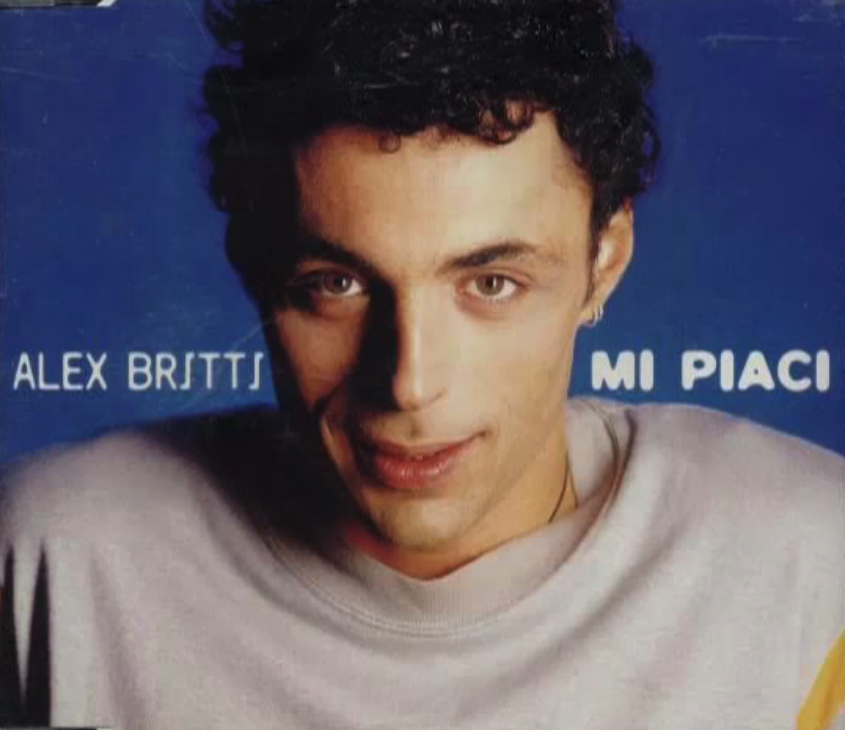I Like You
Another Alex Britti instant classic. Note that in Italian “to like” is a reflexive verb: mi piaci translates literally as “you please me.”
| Cosa vorresti per regalo | What would you like for a gift | |
| da trovare sotto il letto | to find under the bed | |
| un regalo eccezionale | an exceptional gift | |
| o qualche frase che ho già detto | or some phrase that I’ve already said | |
| come quella volta in treno | Like that time in the train | |
| che guardavi dal finestrino | When you looked out the window | |
| t’ho vista e avvicinandomi | I saw you and, drawing near, | |
| cominciai a fare il cretino. | I started to act like an idiot. | |
| “Che ore sono, quanti anni hai, | “What time is it, how old are you | |
| davvero sei di Milano? | Are you really from Milan? | |
| Ho una zia che vive a Brescia | I have an aunt who lives in Brescia | |
| certe volte il mondo è strano.” | Sometimes the world is strange.” | |
| Cosa vorresti che dicessi | What would you like me to say | |
| adesso che ci frequentiamo | now that we’re seeing each other | |
| t’accontenti di “ti voglio bene“ | Will you be satisfied with ti voglio bene | |
| oppure vuoi proprio “ti amo”. | Or do you want the full “I love you” ? | |
| T’ho comprato un cagnolino | I bought you a little dog | |
| che abbaiava raramente | that rarely barked | |
| ma da quando sta con te | but since it’s living with you | |
| si è già mangiato tanta gente. | it’s already eaten many people. | |
| Lo sapevo che eri strana però | I knew you were strange but | |
| non capivo quanto | I didn’t understand how much | |
| e da quando stiamo insieme, | and since we’ve been together | |
| qualche volta ho pianto. | sometimes I’ve cried. | |
| Cosa vorresti da mangiare? | What would you like to eat? | |
| siamo andati al ristorante | We went to a restaurant | |
| sembra non ti piaccia niente | It seems that you don’t like anything | |
| eppure di cose ne hanno tante | Even though they have are a lot of things | |
| allora siamo andati al mare | So then we went to the seaside | |
| così almeno ti rilassi | So at least you could relax | |
| e invece è troppo caldo così anche lì mi stressi. | However, it’s too hot so instead you stress me [out]. | |
| “Andiamo via ti prego, | “Let’s go, I beg you, | |
| andiamo a casa ti farò impazzire” | let’s go home and I’ll drive you crazy” [this is a promise of sex] | |
| ma poi sei troppo stanca | But then you’re too tired | |
| hai mal di testa e vai a dormire | You’ve got a headache and you go to sleep . | |
| Però mi piaci … mi piaci … | But I like you… I like you | |
| che ci posso fare … mi piaci. | What can I do, I like you. | |
| E siamo usciti con gli amici tuoi | And we went out with your friends | |
| almeno sei contenta | So at least you’re happy | |
| siamo andati in birreria | We went to a beer pub | |
| quattro chiacchiere e una pinta | Some chat and a pint | |
| a anche lì neanche a farlo apposta | And there, as if it had been planned, | |
| hai avuto da ridire perché la musica era troppo alta, | You found something to complain about because the music was too loud | |
| hai chiamato il cameriere “questo posto mi fa schifo | You called the waiter, “this place disgusts me | |
| guarda un po’ che serataccia” | Look, what a horrible evening” | |
| lui ovviamente si è incazzato | He, obviously, got pissed off | |
| e ha dato a me un cazzotto in faccia. | And punched me in the face. | |
| Però mi piaci … mi piaci … | But I like you… I like you | |
| che ci posso fare … mi piaci. | What can I do, I like you. | |
| Mi hai convinto che tua madre | You persuaded me that your mother | |
| si sentiva troppo sola | Felt too alone | |
| “viene a stare un po’ da noi | “She’ll come stay with us for a bit, | |
| che una settimana vola” | A week will pass like nothing.” | |
| e così son due anni che mi stressa ogni mattina | And so it’s been two years that she stresses me [out] every morning | |
| dice che lo fa per noi e alle cinque è già in cucina | She says she does it for us and at five [a.m.] she’s already in the kitchen | |
| che prepara non so cosa gli dirà quella sua testa. | Making I don’t know what, her own head tells her | |
| Son due anni di tortura, | It’s two years of torture | |
| dice “vado” e invece resta. | She says “I’m going” but instead she stays. | |
| … | … | |
| Cosa vuoi che dica c’ho creduto veramente | What do you want me to say, I really believed | |
| eri bella come il sole, | you were beautiful as the sun | |
| il resto non contava niente*. | The rest counted for nothing | |
| però adesso hai esagerato ci ho pensato di nascosto | But now you’ve gone too far, I thought secretly: | |
| anche il sole a volte brucia | Even the sun sometimes burns | |
| e accanto a me non c’è più posto. | And next to me there’s no longer a place [any room]. | |
| Ma perché quel giorno che t’ho vista | But why, that day I saw you, | |
| fui così cretino | was I such an idiot ? | |
| se potessi tornare indietro | If I could go back [in time] | |
| ti butterei dal finestrino … | I’d throw you out of that window. | |
| … | … | |
| * Non contava niente – literally “it didn’t count nothing”. In Italian you can use double negatives! | ||





